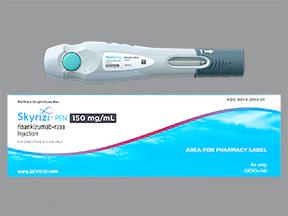Skyrizi Side Effects
Generic name: risankizumab
Note: This document provides detailed information about Skyrizi.
Applies to risankizumab: parenteral injection for iv infusion, parenteral injection for sub-q use Side Effects associated with risankizumab. Some dosage forms listed on this page may not apply specifically to the brand name Skyrizi.
Applies to risankizumab: parenteral injection for iv infusion, parenteral injection for sub-q use.
Side effects include:
Adverse reactions (≥1%) in patients with plaque psoriasis and psoriatic arthritis: upper respiratory infection, headache, fatigue, injection site reaction, tinea infection.
Adverse reactions (>3%) in patients receiving induction treatment for Crohn disease: upper respiratory infection, headache, arthralgia.
Adverse reactions (>3%) in patients receiving maintenance treatment for Crohn disease: arthralgia, injection site reaction, abdominal pain, anemia, pyrexia, back pain, arthropathy, urinary tract infection.
Adverse reactions (≥3%) in patients receiving induction treatment for ulcerative colitis: arthralgia.
Adverse reactions (≥3%) in patients receiving maintenance treatment for ulcerative colitis: arthralgia, pyrexia, injection site reactions, rash.
For healthcare professionals
Applies to risankizumab: intravenous solution, subcutaneous kit, subcutaneous solution.
Gastrointestinal adverse events
- Common (1% to 10%): Abdominal pain[Ref]
Dermatologic
- Common (1% to 10%): Tinea infections (e.g., tinea pedis, tinea cruris, body tinea, tinea versicolor, tinea manuum, tinea infection)
- Uncommon (0.1% to 1%): Folliculitis, urticaria
Postmarketing: Eczema, rash[Ref]
Hematologic
- Common (1% to 10%): Anemia[Ref]
Hypersensitivity
- Common (1% to 10%): Hypersensitivity reactions[Ref]
Hypersensitivity
Immunologic
- Very common (10% or more): Immunogenicity (24%), infections (e.g., cellulitis, osteomyelitis, sepsis, herpes zoster) (22%)[Ref]
Local
- Common (1% to 10%): Injection site reactions (e.g., bruising, erythema, extravasation, hematoma, hemorrhage, infection, inflammation, irritation, pain, pruritus, reaction, swelling, warmth)[Ref]
Musculoskeletal
- Common (1% to 10%): Arthralgia, arthropathy, back pain[Ref]
Nervous system
- Common (1% to 10%): Headache (e.g., tension headache, sinus headache, cervicogenic headache)[Ref]
Other
- Common (1% to 10%): Fatigue, asthenia, pyrexia[Ref]
Respiratory
- Very common (10% or more): Upper respiratory infections (e.g., respiratory tract infection [viral, bacterial, unspecified], sinusitis [including acute], rhinitis, nasopharyngitis, pharyngitis [including viral], tonsillitis) (up to 13%)[Ref]
References
1. (2024) "Product Information. Skyrizi (risankizumab)." AbbVie US LLC, SUPPL-32
2. (2019) "Product Information. Skyrizi (risankizumab)." AbbVie US LLC
Frequently asked questions
- What are monoclonal antibodies?
- What's the dosing schedule for Skyrizi?
- Does Skyrizi cause cancer?
- Can you drink alcohol while taking Skyrizi?
- Skyrizi vs Humira for plaque psoriasis - How do they compare?
- Who makes Skyrizi and where is it made?
- Is Skyrizi approved for treating psoriatic arthritis?
- Does Skyrizi cause hair loss?
- Skyrizi vs Ilumya. What’s the difference?
More about Skyrizi (risankizumab)
- Check interactions
- Compare alternatives
- Pricing & coupons
- Reviews (57)
- Drug images
- Dosage information
- Patient tips
- During pregnancy
- Support group
- FDA approval history
- Drug class: interleukin inhibitors
- Breastfeeding
- En español
Patient resources
Professional resources
Related treatment guides
Further information
Skyrizi side effects can vary depending on the individual. Always consult your healthcare provider to ensure the information displayed on this page applies to your personal circumstances.
Note: Medication side effects may be underreported. If you are experiencing side effects that are not listed, submit a report to the FDA by following this guide.

